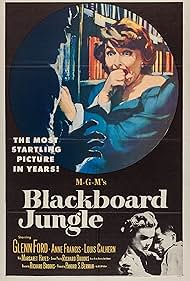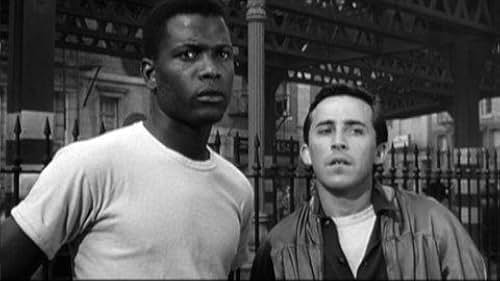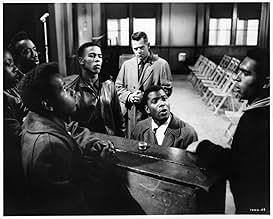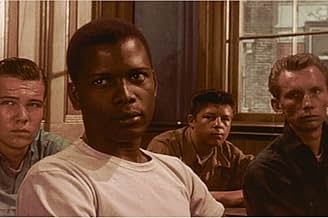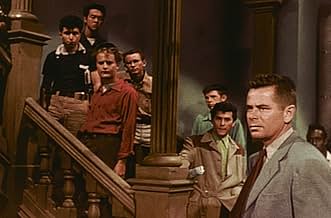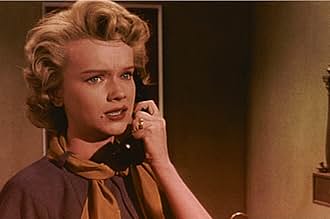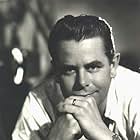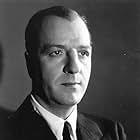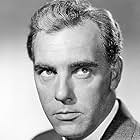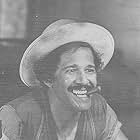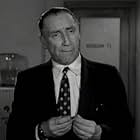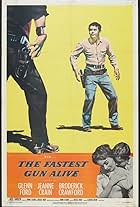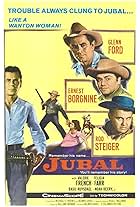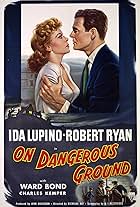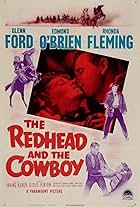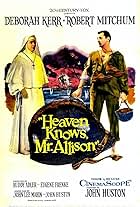A new English teacher at a violent, unruly inner-city school is determined to do his job, despite resistance from both students and faculty.A new English teacher at a violent, unruly inner-city school is determined to do his job, despite resistance from both students and faculty.A new English teacher at a violent, unruly inner-city school is determined to do his job, despite resistance from both students and faculty.
- Nominated for 4 Oscars
- 1 win & 6 nominations total
Jamie Farr
- Santini
- (as Jameel Farah)
David Alpert
- Lou Savoldi
- (uncredited)
- Director
- Writers
- All cast & crew
- Production, box office & more at IMDbPro
Storyline
Did you know
- TriviaClare Boothe Luce, then U.S. Ambassador to Italy, prevented the film from being shown at the Venice Film Festival; and a Senate committee had decided that the film would not have beneficial effects on contemporary youth. Both incidents only served to increase publicity and ticket sales for the controversial movie.
- GoofsIn the garage scene, when Miller starts fixing the car, he says "nobody gives a hoot", but his lips indicates he really says "nobody gives a damn". The replacement of the profanity is made humorous by the director, who chose to play the sound effect of a car horn when the word "hoot" is uttered.
- Quotes
Richard Dadier: Yeah, I've been beaten up, but I'm not beaten. I'm not beaten, and I'm not quittin'.
- Crazy credits"We, in the United States, are fortunate to have a school system that is a tribute to our communities and to our faith in American youth. Today we are concerned with juvenile delinquency -- its causes -- and its effects. We are especially concerned when this delinquency boils over into our schools. The scenes and incidents depicted here are fictional. However, we believe that public awareness is a first step toward a remedy for any problem. Is is in this spirit and with this faith that BLACKBOARD JUNGLE was produced."
- Alternate versionsThe film was originally rejected in the UK for containing "unbridled, revolting hooliganism" and having a "damaging and harmful effect (on teenagers)". Following protests from the distributor, it was viewed again but there was an even split between examiners in favor of banning it again or cutting it for an X (16) certificate. After further meetings where the distributor claimed it had a sincere moral purpose, a cuts list was drawn up which removed around five minutes of footage. This included the following:
- The foreword which absolved the US of blame regarding its realistic depiction - this was added specifically for foreign releases following the huge controversy it caused back home. It reads: "We, in the United States, are fortunate to have a school system that is a tribute to our communities and to our faith in American youth. Today we are concerned with juvenile delinquency -- its causes -- and its effects. We are especially concerned when this delinquency boils over into our schools. The scenes and incidents depicted here are fictional. However, we believe that public awareness is a first step toward a remedy for any problem. It is in this spirit and with this faith that BLACKBOARD JUNGLE was produced."
- Male pupils leering at women.
- A boy assaulting a female teacher.
- Dadier being attacked.
- Dadier being threatened by a knife-wielding pupil.
- The planning and execution of a van robbery.
- Dadier fighting back against a pupil.
- ConnectionsEdited into Heavy Petting (1989)
- SoundtracksRock Around the Clock
Written by James E. Myers and Max Freedman
Performed by Bill Haley and the Comets
Courtesy of Decca Records, Inc.
Featured review
I chose to watch Blackboard Jungle after I saw Rebel Without a Cause in Film class. I enjoyed the first movie and after I learned what Jungle was about, I assumed that I would enjoy it as much as Rebel. I was wrong; I enjoyed Blackboard Jungle twice as much.
Blackboard Jungle premiered in 1955, the same year as Rebel Without a Cause and historical milestones such as Rosa Parks' monumental protest of bus segregation. In fact, race relations pay an important part in this film, which I will discuss later. The movie is about a teacher, Richard Dadier, who accepts a job at North Manual High School. At this school, he encounters a school-wide discipline problem. The two main perpetrators in Dadier's class are Gregory Miller, a black student whom Dadier comes to see much promise in, and Vic Morrow, the true instigator of violence, whose gang attacks Dadier. Over the course of the film, Dadier also encounters apathetic teachers, a principal in denial, and a wife who gives birth prematurely. Eventually, Dadier must decide if his pursuit to teach is important enough to endure the hardship.
This movie brings up some very important issues that were just important in 1955 as they are in 2001. Violence in schools is still a major topic, culminating in the Columbine shooting which everyone should remember. Also important is how teachers are to deal with this threat. Dadier dealt with it by reaching out to Miller and by confronting Morrow. But is this a realistic scenario? Sometimes students just cannot be reached, and it is irresponsible to ask teachers to directly confront weapon-totin students who have a propensity for violence. This just goes to show that solving violence in schools is difficult. It has taken at least 46 years; it will probably take many more.
No female students are portrayed in Blackboard Jungle. This contributes to the stereotype that usually teenage boys are the ones who instigate violence. Of course, the statistics show that male students are mostly responsible for school violence, and many stereotypes exist for a reason. Rebel Without a Cause demonstrates the female role in school insubordination well, by including a woman in the main gang. Still, I would have liked to see a female student element in Jungle, to show that girls are often involved, and that they also influence male student's behavior.
For the era, the racial attitude of Blackboard Jungle is very progressive. Dadier confronts racial slurs in the classroom. The principal, who was tipped off by a student that Dadier was using racial epithets (when all he was demonstrating was the dangerous consequences of such racism), is not happy with this report and chastises Dadier. Both situations show that two important protagonists object to racism, signifying the film's aversion to this social aspect. This comes just after Brown v Board, simultaneous to Rosa Parks' significance, and long before the high point of the Civil Rights Movement. Blackboard Jungle should undoubtedly be recognized for its attitude on race relations and other controversial elements, such as rock and roll. At a time when rock music was still controversial and outside the mainstream, Blackboard Jungle opened and closed with Bill Haley and the Comet's "Rock Around the Clock." This was a bold step to take and was one of the reasons that the film was banned from many theatres. The relatively violent content also contributed to the barring of the movie and probably contributed to many riots that occurred in theatres while the movie was shown.
Overall, I enjoyed this movie, both for the issues it addressed, its support for educators and their responsibilities, and for its entertainment value alone. I highly recommend this film to anyone who is interested in educational dilemma, or someone who simply would enjoy a classic film with a progressive, realistic attitude. However, for anyone looking for a clone of Rebel Without a Cause, they won't find what they're looking for, but I guarantee they will enjoy it just the same.
Blackboard Jungle premiered in 1955, the same year as Rebel Without a Cause and historical milestones such as Rosa Parks' monumental protest of bus segregation. In fact, race relations pay an important part in this film, which I will discuss later. The movie is about a teacher, Richard Dadier, who accepts a job at North Manual High School. At this school, he encounters a school-wide discipline problem. The two main perpetrators in Dadier's class are Gregory Miller, a black student whom Dadier comes to see much promise in, and Vic Morrow, the true instigator of violence, whose gang attacks Dadier. Over the course of the film, Dadier also encounters apathetic teachers, a principal in denial, and a wife who gives birth prematurely. Eventually, Dadier must decide if his pursuit to teach is important enough to endure the hardship.
This movie brings up some very important issues that were just important in 1955 as they are in 2001. Violence in schools is still a major topic, culminating in the Columbine shooting which everyone should remember. Also important is how teachers are to deal with this threat. Dadier dealt with it by reaching out to Miller and by confronting Morrow. But is this a realistic scenario? Sometimes students just cannot be reached, and it is irresponsible to ask teachers to directly confront weapon-totin students who have a propensity for violence. This just goes to show that solving violence in schools is difficult. It has taken at least 46 years; it will probably take many more.
No female students are portrayed in Blackboard Jungle. This contributes to the stereotype that usually teenage boys are the ones who instigate violence. Of course, the statistics show that male students are mostly responsible for school violence, and many stereotypes exist for a reason. Rebel Without a Cause demonstrates the female role in school insubordination well, by including a woman in the main gang. Still, I would have liked to see a female student element in Jungle, to show that girls are often involved, and that they also influence male student's behavior.
For the era, the racial attitude of Blackboard Jungle is very progressive. Dadier confronts racial slurs in the classroom. The principal, who was tipped off by a student that Dadier was using racial epithets (when all he was demonstrating was the dangerous consequences of such racism), is not happy with this report and chastises Dadier. Both situations show that two important protagonists object to racism, signifying the film's aversion to this social aspect. This comes just after Brown v Board, simultaneous to Rosa Parks' significance, and long before the high point of the Civil Rights Movement. Blackboard Jungle should undoubtedly be recognized for its attitude on race relations and other controversial elements, such as rock and roll. At a time when rock music was still controversial and outside the mainstream, Blackboard Jungle opened and closed with Bill Haley and the Comet's "Rock Around the Clock." This was a bold step to take and was one of the reasons that the film was banned from many theatres. The relatively violent content also contributed to the barring of the movie and probably contributed to many riots that occurred in theatres while the movie was shown.
Overall, I enjoyed this movie, both for the issues it addressed, its support for educators and their responsibilities, and for its entertainment value alone. I highly recommend this film to anyone who is interested in educational dilemma, or someone who simply would enjoy a classic film with a progressive, realistic attitude. However, for anyone looking for a clone of Rebel Without a Cause, they won't find what they're looking for, but I guarantee they will enjoy it just the same.
Details
Box office
- Budget
- $1,168,000 (estimated)
- Runtime1 hour 41 minutes
- Color
- Aspect ratio
- 1.75 : 1
Contribute to this page
Suggest an edit or add missing content

